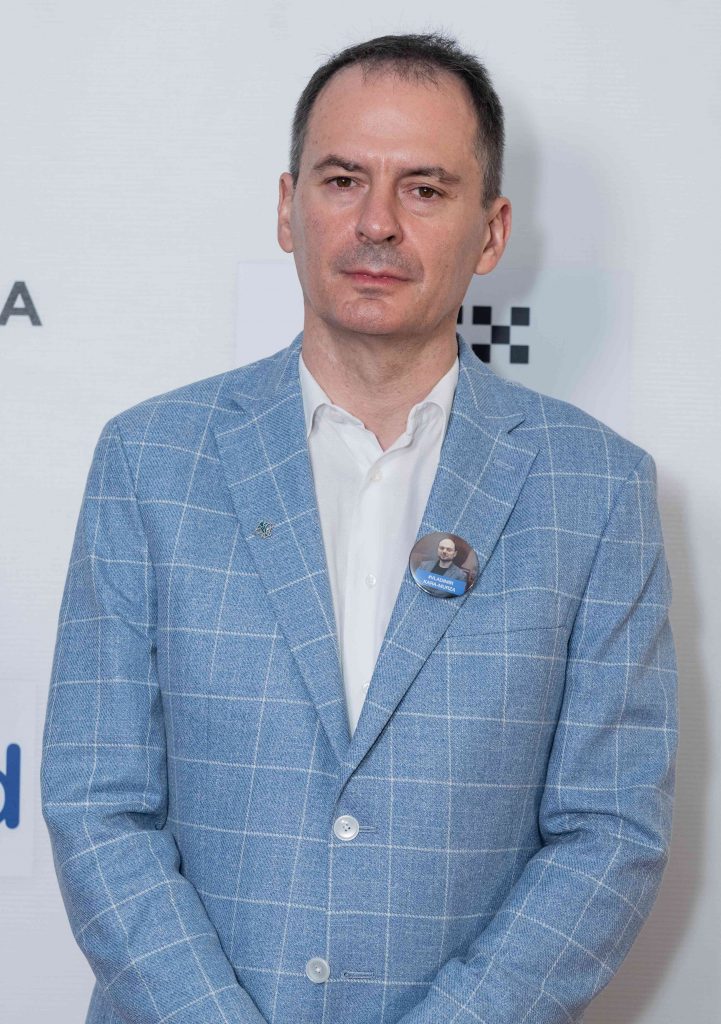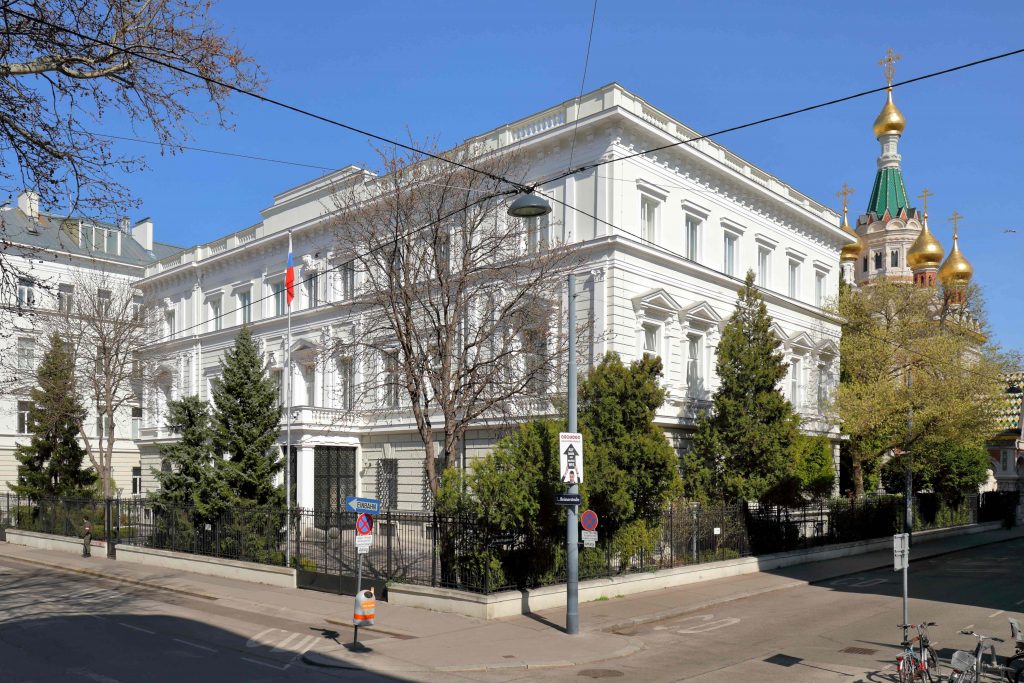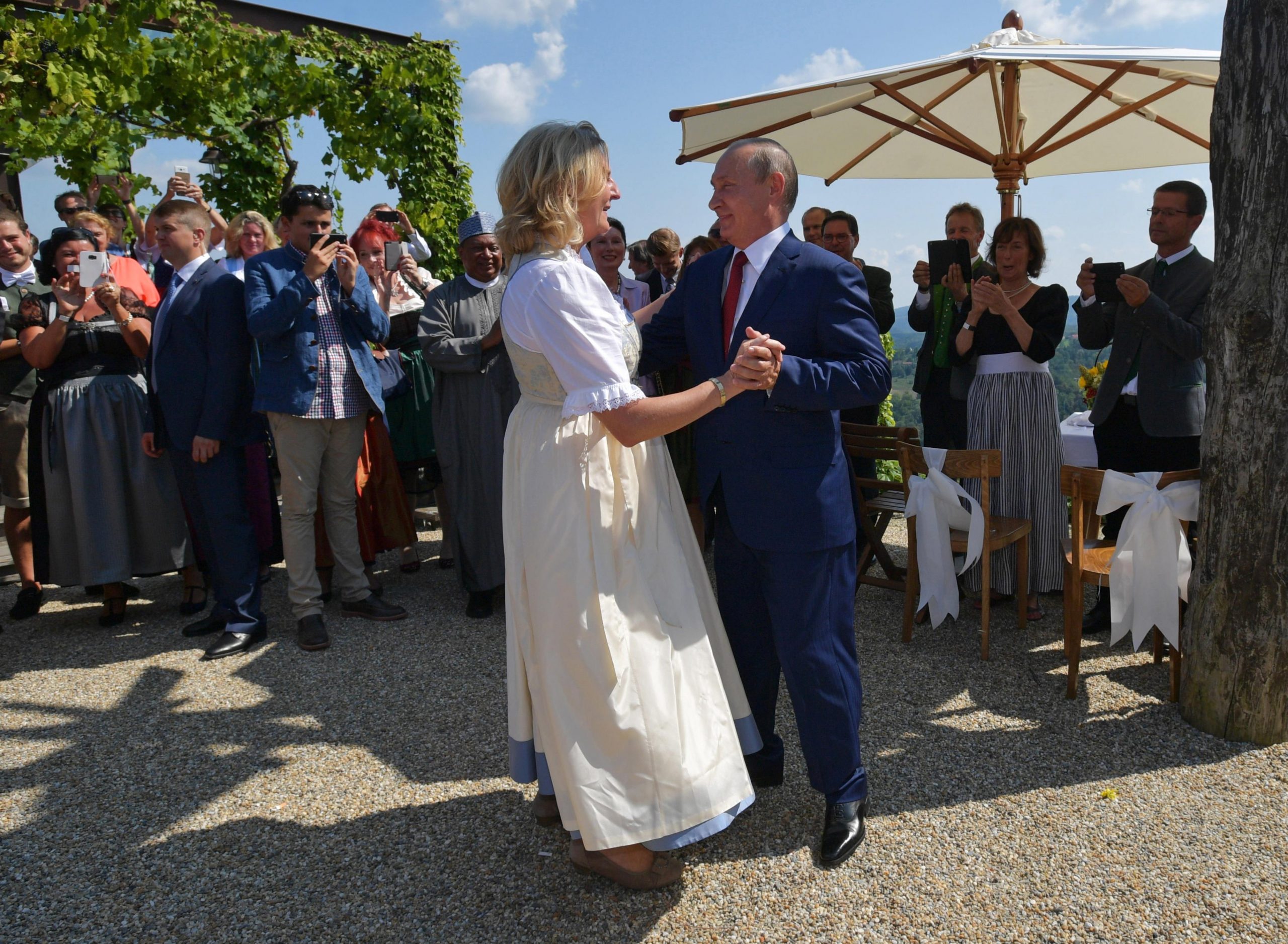VIENNA—Inside a stately art nouveau building in central Vienna, special-forces officers armed with submachine guns guard the home of Christo Grozev , an investigative journalist whose Academy Award-winning documentary exposed the Kremlin’s attempt to kill opposition leader Alexei Navalny .

Investigative journalist Christo Grozev was warned that Russian spies were plotting to kill him.
Two years ago, Austrian intelligence and U.S. law enforcement warned Grozev that Russian President Vladimir Putin ’s spies were plotting to kill him. After living with his family for two decades in Austria, the Bulgaria-born Grozev fled to the U.S. in 2023. Now, when he returns to visit his family, who remained behind in Vienna, he receives a degree of state protection that rivals that of Austria’s chancellor, officials say.
The failed murder plot is one of a series of incidents that show how Vienna has emerged as Russia’s new espionage hub in Europe after capitals there expelled 600 spies posing as diplomats in the wake of the invasion of Ukraine.
Dozens of these spies have since resurfaced in Austria, intelligence officials there say. In the past two years, the number of Russian state employees in Austria swelled to over 500 from 300 to 400, over a half of whom are diplomats and administrators, according to intelligence officials. Up to a half of them operate as spies, Austrian intelligence officials estimate.
Last year, neighboring Germany closed the Russian consulate in Munich, which German officials said was hosting a number of spies. The Russian staff simply relocated to Salzburg, an Austrian city across the border to the east, Austrian intelligence officials say.
Vienna is now a base for Russian clandestine operations, including financing and logistical support for murder, sabotage and recruitment across Europe, as well as industrial espionage and influence operations, according to over a dozen Austrian, European and U.S. intelligence and government officials.
The Russian Embassy in Washington didn’t immediately respond to a request for comment.
Russian diplomats and support staff operate in Vienna from over 40 properties owned by Moscow and people or companies linked to the Russian state. Surveillance equipment has sprouted up on the roofs of such properties, some used to tap satellite telecommunications.
An Austrian Interior Ministry spokesman said that Austria is one of the safest countries due to its well-functioning security agencies. The spokesman said that the country’s intelligence agency is aware that Austria has become a target for Russian espionage and influence operations and that the agency counters threats from state actors within its legal limits.
During the Cold War, the city was a notorious international spying hub, as immortalized in the Hollywood classic, “The Third Man.” Espionage is legal in Austria, which is a member of the European Union, as long as it isn’t directed against Austria itself. A neutral country outside military alliances, Austria hosts international organizations, including United Nations agencies and the Organization of the Petroleum Exporting Countries, some of which have long had spies in their delegations, according to multiple Austrian and foreign officials.
Russian influence runs deep in Austria, dating back to when Moscow was an occupying power of the country after World War II.

The Russian Embassy in Vienna. The number of Russian state employees in the country swelled to over 500 from 300 to 400 in the past two years. / C.Stadler/Bwag; CC-BY-SA-4.0
For instance, in 2018, photos of Putin dancing with Austria’s Foreign Minister Karin Kneissl at her wedding caused an uproar. The Foreign Ministry is in charge of approving diplomats’ accreditations—as well as expelling them. In 2023, Kneissl moved to Russia, where she runs a think tank. The Russian air force helped move her household, including her ponies.
Vienna-based Russian operatives are suspected of helping with the recruiting and financing of Russian operations such as tracking Western arms shipments to Kyiv in Poland and killing a Russian military helicopter pilot who defected to Ukraine and was living in Spain, Western security officials say. The killers, who shot the man five times and then ran him over with an SUV, were criminals paid with cash provided by Russian state employees from Vienna, these officials say.
“We are now becoming a liability for our neighbors because Russia is using us as an operational base,” a senior Austrian intelligence official said.
Russia sends large volumes of cash into neighboring countries such as Lithuania by road, an Austrian intelligence official said. From there, Austria-based diplomats ferry it across Europe, often in diplomatic pouches that can’t be checked by police.
Now, other EU nations are considering a Czech proposal for a ban on Russian diplomats traveling outside the country where they are posted.
“If these diplomats want to work in Vienna, then that is perfectly fine…but I see no reason why they should have free access to the Czech Republic,” the Czech Foreign Minister Jan Lipavský said, claiming that Russian diplomats engage in nefarious activities. Russian or Russian-paid saboteurs were found by Czech police and prosecutors to be behind a number of attacks on ammunitions factories and civilian targets.
The Austrian government must end its “extremely dangerous inaction” on Russia spying, which is “weakening efforts to curb Russian influence in Europe,” said Stephanie Krisper, an Austrian opposition legislator who sits on the committee scrutinizing intelligence operations.
Russia is rebuilding its spying network by recruiting civilians, organized-crime figures, hackers and private detectives for attacks on and surveillance of critical infrastructure and other operations across the continent.
“Russian intelligence is now like an octopus using every tentacle at its disposal, and the head is currently in central Europe,” a European intelligence officer said.
The U.S. also keeps a large spying contingent in Austria, which is the seat of the Central Intelligence Agency’s regional center overseeing activities in Eastern Europe and the Balkans.
Some U.S. officials believe that Russia grew bolder in recent years and began targeting American personnel. In 2021, 20 U.S. Embassy staff, including CIA officers, based in Vienna became ill with a mysterious condition known as the Havana Syndrome , according to several U.S. and Austrian officials.
The Russians possibly used acoustic or “directed energy” weapons against the U.S. personnel, said Amb. John Bolton , former President Donald Trump ’s national security adviser from 2018 to 2019, when some of the reported Havana Syndrome incidents occurred in various countries. The inability of the U.S. to protect personnel from the attacks “means that the Russians or whoever is doing it are way ahead of us,” he said.
In 2023, the U.S. intelligence community said there was no evidence that a foreign adversary had used any such weapon.
Austria’s intelligence service itself has allegedly been penetrated by Russian spies. Earlier this year, Egisto Ott, a senior undercover operations official, was arrested on various charges including accusations of spying for Russia. Ott’s lawyer Jürgen Stephan Mertens didn’t immediately respond for a request for comment. Mertens told Austrian media that the accusations against Ott were unfounded and lacking solid evidence. In an interview with The Wall Street Journal before his arrest, Ott denied he was a Russian spy.
The agency’s former head of operations Martin Weiss, also suspected by Austrian investigators of being a Russian spy, fled to Dubai in 2021. Austria is seeking his extradition for a number of accusations, including some related to the Grozev case, such as using Ott to obtain the journalist’s personal details. Weiss didn’t respond to requests for comment.
Both men worked for Jan Marsalek , the Austria-born former chief operating officer of fintech group Wirecard , which collapsed in a major fraud case in 2020. Marsalek, who fled to Moscow to avoid arrest, has been working for Russian intelligence for over a decade and now holds a senior role with the FSB, Russia’s main intelligence service, according to European officials.
Marsalek coordinated at least one team that participated in the plot against Grozev, according to legal documents. Moreover, Austrian authorities have accused Ott in their arrest warrant, seen by the Journal, of using his intelligence connections to obtain Grozev’s address and passing it on to Marsalek and to Russian agents.
A team coordinated by Marsalek then began following Grozev. They stole electronic equipment including laptops from his homes in Vienna and Bulgaria, according to investigators in several European countries. The goal was to capture and kill him, say investigators.
Several people involved in the plot have since been arrested. One was identified after Grozev’s teenage daughter took a picture in 2022 of a man loitering outside a cafe where she was lunching with her father.
After the plot was discovered, the new head of the Austrian intelligence agency, Omar Haijawi-Pirchner, who has been cleansing the body of suspected Russian sympathizers, personally vouched for the security of the Grozevs.
Russian spies have photographed the Grozevs’ security team in an attempt to establish their identities, according to Austrian intelligence officials.
On Tuesday, Grozev said the Austrian government must do more to curb Russian espionage, saying it had penetrated Austrian institutions and its business community.
“Austria only has the counterespionage infrastructure of a very small country, although given the concentration of spies and its importance as a hub for intelligence services, it should have that of a much larger country,” he said in the presence of armed guards.
In the wake of the investigation, Austria’s justice minister has said he wants to change the law that allows for spying.
In the past two years. Haijawi-Pirchner, a former police officer without prior links to the agency, successfully pushed for the expulsion of 11 Russian spies accredited as diplomats, according to several Austrian officials. He has asked for the expulsion of over a dozen other Russian diplomats, but the government has yet to react, two officials said.
Some Western intelligence agencies that had curbed their cooperation with Vienna during the recent scandals said they had re-established some intelligence sharing with Austria after Haijawi-Pirchner purged the service of Russian influence.
A spokeswoman for the Austrian Foreign Ministry said it supports requests to expel all diplomats who violate laws and regulations when firm evidence is presented. The Chancellery didn’t immediately respond to a request for comment.
The scandals are sparking a reassessment of Austria’s ties to Russia—potentially to the benefit of the U.S.
The U.S. had already sought to pull Austria away from Russia in recent years, said Trevor Traina, U.S. ambassador to Vienna between 2018 and 2021. He said he persuaded his hosts to expel a Russian spy accredited as a diplomat, at the time viewed as a great success for U.S. policy.
Then last year, the U.S. grew alarmed at a plan by Austria’s Raiffeisen Bank International to compensate Putin ally Oleg Deripaska for a $1.6 billion stake in a local construction company that was frozen due to U.S. sanctions against the oligarch. Raiffeisen has come under fire for being the biggest Western bank still operating in Russia.
Secretary of State Antony Blinken asked Austrian Chancellor Karl Nehammer to block the plan, according to officials familiar with the talks. The Austrian government scuttled the deal.
Write to Bojan Pancevski at bojan.pancevski@wsj.com



